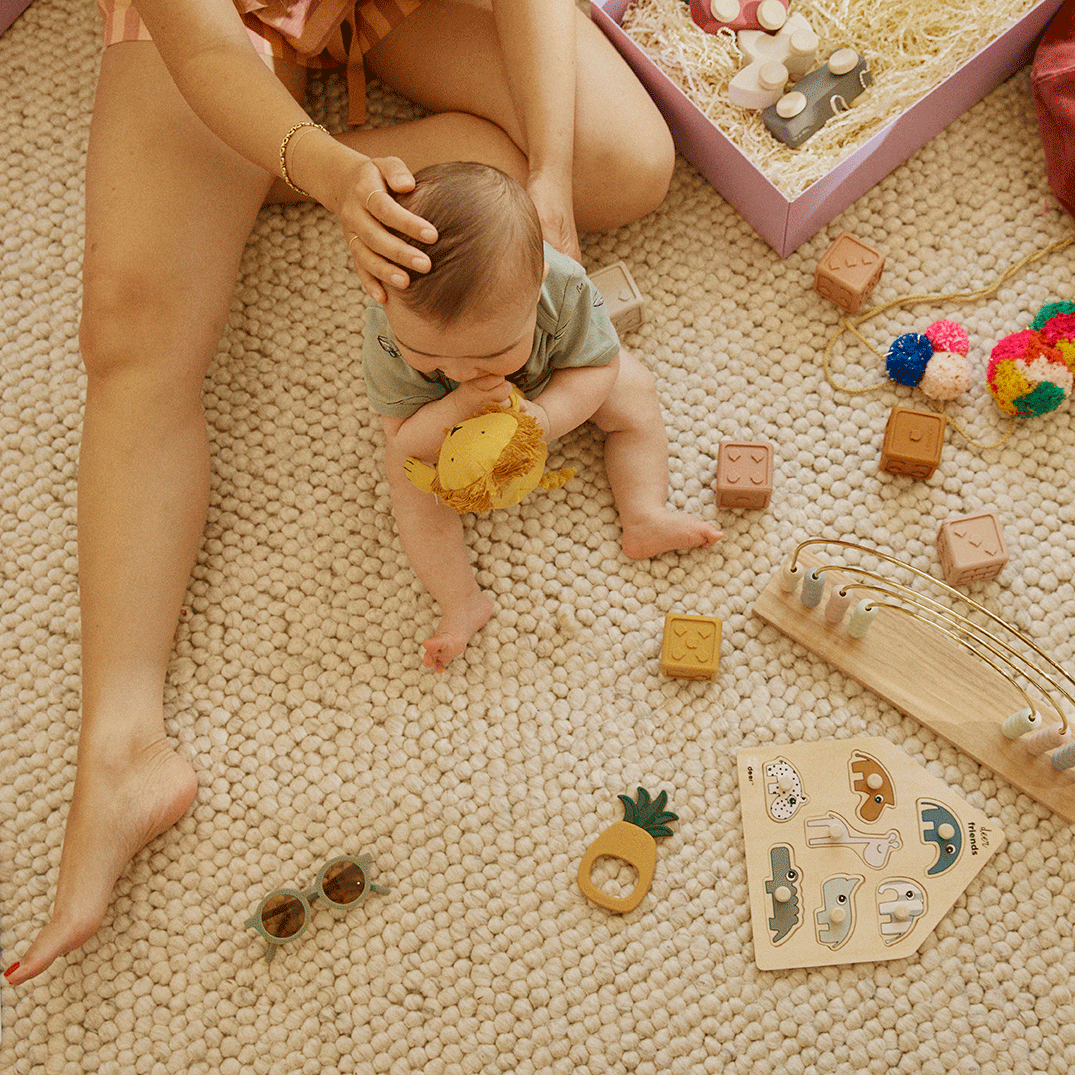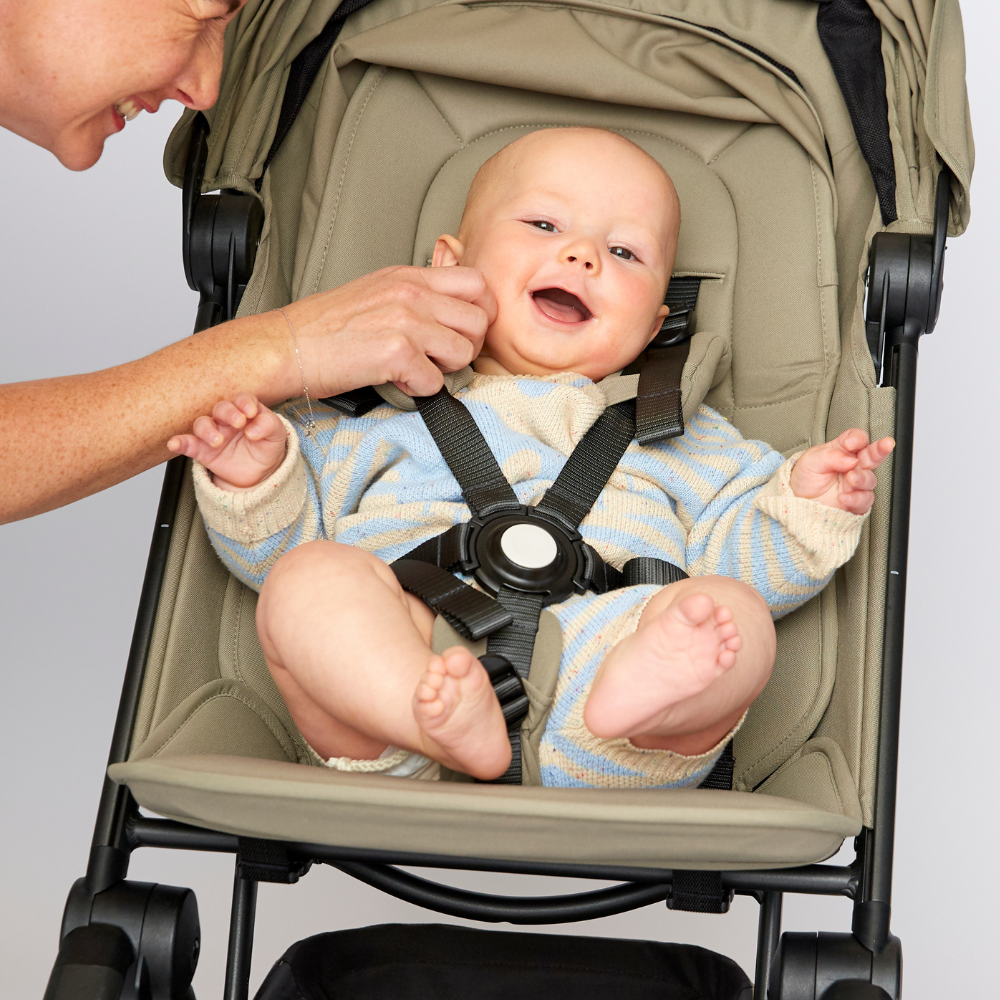'Tis the season ... to feel a bit stressed. Demanding travel schedules, social engagements, over-opinionated family members and the pressure to give it your all — in dollars and energy — it's a lot. Especially if you have small children. To help ease some anxieties and get some coping techniques under your Christmas tool belt, we spoke to Melbourne-based clinical psychologist Caitlin Arthur about the things our community told us they feel most overwhelmed about at this most wonderful time of year.
Feeling overwhelmed about the holidays? People kissing your baby, judging your parenting, naps getting screwed, pressure to participate, the travel, the expense, the inevitable drama... The first thing Arthur wants you to do is give yourself a pat on the back. "Good on you for noticing that you feel overwhelmed. In order to regulate our emotions, we first need to be tuned in to how we feel and our state of being. So that's so important." She also wants you to know it's OK to feel a bit swamped. "Christmas time can be busy and full on, and for some people it can be a time fraught with difficult emotions, depending on your wider family story, so give yourself permission to feel a bit stressed. With kids, it can be so tough any time of year, let alone when you’re staying with others or trying to do a heap of social activities. So yes, it's so understandable that you are feeling overwhelmed, and that is OK."
Arthur says as a first step, speak with your coparent, "Acknowledge that you have your own little family now, and set parameters to protect it. Word-up your larger family ahead of time that you’ll try your best to be part of as many events as you can, but you might have to sit some things out, and then decline offers if you need to — especially true, if you’re someone who finds company depletes your energy stores."
With those positive actions in place, let's get into your more specific stresses.
You're worried about your routine getting messed with...
"Having a regular routine definitely helps our kids to thrive," says Arthur. "It can be really unsettling when the routine is thrown out. When you're going to stay with other people, it can be helpful to clue them in and let them know the points in your day that you work around and ask, if it’s at all possible, for them to be accommodated." Mostly families are happy to work around you. Lunch at 2pm rather than 12pm, so baby gets their nap in? It's a small adjustment for everyone else that might mean a lot to you, so ask. Unless they have recently had kids themselves, they aren't going to know the sleep cycle of a 6-month-old, and you can't expect them to, so clue them in. Arthur says it's also good to get comfortable with saying 'no'. "If there’s an event or activity that’s just really going to throw things out, and it's really not going to be worth it for you, just say no." Finally, know that it's not the end of the world if naps get missed or meal times pushed. "Give yourself permission for your routine to get a little messed up. It’s only natural to want to hold tighter to routine and search for more control when things feel as if they are unravelling, however it can be wise to know when to let go of your usual expectations and procedures. Also, know that a few days of your routine being messed up isn’t going to unravel all the good work you’ve done. When you get back to your own place, things will fall back into place. You, as the mum, are your kids’ constant, and at the end of a Christmas pud-stuffed day, your love and emotional presence is all they need. Take comfort in knowing, and things will resettle when you’re back home and the chaos will become a distant memory."
You're worried about judgement...
"It’s perfectly natural to be worried about judgement," says Arthur. "We see a lot of the mum who is doing it all, she has the perfectly dressed baby, the clean house and the perfect Santa photo, but that’s not the reality, and we all know that. Parenting can serve up a smörgåsbord of judgement, perceived or real. The most important thing to do is be wary that the way we see the world, affects the way we feel, and how we interpret something that’s been said, might not be how it was meant. It can be helpful to practice tuning into your perceptions and question whether what was said or done was grounded in reality. However, if someone does make a comment that feels unkind or judgey, you have a choice to let it go and remain confident that you are making the best choice for your child because you know them best, or politely inform the person that those comments just aren’t helpful. Tell them that the early years of parenting are really hard, and hearing about the things you’re doing really well with would be much more helpful." This applies to what you feed your kids, how you manage their feelings or actions and decisions you make about letting people hold/kiss your baby (or bump). "Be aware of what helps you, and go to that. We put a lot of expectations on ourselves, particularly if your someone who doesn’t like to let people down, we can be burdened with guilt, but just give yourself permission to not meet everybody’s needs. Also, what we might think of as letting someone down might not bother them at all."
You're worried about family parenting your kids differently to how you do...
"It's safe to say there has been a real shift from more authoritarian parenting that was about stamping out behaviours we don't want to see, to one that is more gentle and places the focus on why a child is behaving a certain way. So the way things are done now can look quite different. If you can, try to share with your family ahead of time how you handle situations and that you'd like them to follow suit. Often your family are going to want to be told what to do. "You can also be the best teacher just by modelling how you parent," says Arthur. "However, we must accept that we cannot control the thoughts and actions or feelings of someone else. Even though we might want to, especially when the stakes are so high, it is our kids afterall. It can be a tough thing to swallow, but please, don’t waste your very precious energy on things you can't control. If we let go of what we can't control, we free ourselves to be more happy in the moment. Unless what they are doing is very unsafe, or very unkind, or really goes against your values, try to let it go. Take comfort knowing that as the primary caregivers, you are the biggest influence on your children. The way you respond to your kids is the most important."
You're worried about your kids seeing less than ideal adult-behaviour...
"If you know ahead of time, that usually, something goes down with a particular person every year, do your best to make sure your kids aren't aroundfor that, or shield them from it," says Arthur. "You can also ask that family member not to do that particular thing infront of your kids. If something happens in the moment that makes your kid feel uncomfortable, try to redirect their attention or take them away. The next step depends on your kids' age. If they are old enough to talk to you about what they saw, then | encourage you to make the space for them to do that. Check-in with them and see if they have any questions about what they saw — we know that making sense of things by talking can help to contain us. When you can’t put words to something, it can whiz around in your mind and have the potential to be damaging — so provide reassurance for your children, age-appropriate explanations and then reassure them that they can check back in with you at any point."
"Take comfort knowing that as the primary caregivers, you are the biggest influence on your children."
You feel resentful about having to travel so far...
Arthur wonders whether this might be part of a bigger question. She asks "Is this feeling of resentment part of a bigger pattern connected to you continually feeling as if you're being asked to do something that is more than what you feel is reasonable? If so, | really encourage you to assert yourself and to state your needs. This is a common treatment focus for a lot of people in therapy. Stating what you need is also brilliant for your kids, role modelling for them stating what you need in a polite, respectful way is amazing for helping them learn to ask for what they need." Apart from this, the fact is, unless you all live in the same town, Christmas time usually involves some travel and it is such an effort, so the feeling might be isolated, but you still need to turn it around. "Meet thoughts of resentment with the redirection to thoughts that are more helpful. Think about all the extra help you'll get being with your family, or just the break from the daily grind of being home, or how lovely it will be to see your kids play with their cousins. Direct your mental energy to things that are helpful and try to find things to be grateful for: like having somewhere to spend Christmas and beautiful children to spend it with."
You're worried about family members over-spending on your kids...
"People have different ways of showing love, and for some that is to make demonstrative displays with gifts," says Arthur. Often friends and family ask what they can get your kids, and you should feel free to be specific or encourage experiences. If those requests fall of deaf ears and your kids get given a ton of presents, Arthur says to take pause. "You could resist the gifts and efforts to spoil, however be mindful that this might feel rejecting and hurtful for those who have gone to lengths to choose and procure things they think your little people will love. Or you could lean into it, enjoy watching your children delight in their new things, and the joy it brings to the givers. You can take the lead and model how to show gratitude for receiving them. If you find you've accumulated a huge amount of gifts you can help your children take them to charity shops down the track, or do toy swaps with kids in your local area."
You're worried about losing it at family members over the holidays...
“Go into the holidays being mindful of any events that you know might particularly push your buttons, and go in with a conscious effort to monitor your thoughts and feelings in those moments. We repeat our patterns and it's very easy to get sucked back into old roles that might not suit us anymore. So ‘people pleaser’ or ‘trouble maker’. So, have a good think in advance, monitor, and be ready to hit pause before you respond," says Arthur. "A lot of interpersonal conflict comes from either not seeing, or not trying to see, someone else’s point of view. So try and think about that and go into the holiday celebrations with what's called an observing stance. Rather than walking into the festivities being the star of the show and* in* the drama, approach it like a movie, take a step back and watch it unfold, you don’t have to get involved. It can be quite empowering to have that detached position. If you do get caught up in the heat of the moment and lose it, know that you can't think straight. Your emotional brain has hijacked your thinking brain. Try to hit pause — literally take some breaths, count to ten, give yourself time for your thinking brain to come back online. If it's too late and you've really blown it and you really regret it, then when you are calmer, a repair can go a really long way, for the other person and yourself. Own and acknowledge your actions that you're not proud of. It can be so freeing, and it’s great modelling for our kids. Showing them we own mistakes and apologise."
You're stressed about people holding or kissing your baby (or bump)...
“In short, | recommend doing what you feel most comfortable with and sometimes this might mean keeping the baby close to you even if it upsets others. Also, if someone is holding your baby and you notice their cues for food, sleep, or wanting to be close to you, then ask for them back so you can attend to them. Sometimes we worry about upsetting the other person, but trust yourself that as their mother you know what they need. Having said that, and I appreciate that there might be different advice about this, I do recommend allowing others to hold your baby. For those mums out there who are worried, know that it's only natural to want to avoid what makes us scared, but the more we avoid something the scarier it becomes in our mind. Allowing others to hold your baby not only offers time for you to eat with two hands, but gives you the opportunity to prove to yourself that others can safely and lovingly spend time with your little one, which will be helpful down the track when you will inevitably need to have time apart. Babies intuit mother's state of being so if you find you are getting really worked up about this then this will filter through to the baby. Start with small amounts of time and build from there until you become comfortable. If it is really stressing you out and preoccupying you, | recommend getting in touch with someone to talk through any deeper anxiety that might be underlying it. With regards to your bump; being pregnant is not an open invitation to be touched or be the subject of public conversation! If you do not want to be touched, say so and feel happy knowing you've been able to set the boundaries for yourself.”
Quick Ways to Save Your Sanity Over the Holidays
- Hydrate. Water helps everything.
- Sleep. Keep a sleep routine for yourself and try to stick to it.
- Take moments for yourself. Particularly important for those who burn out from being with company. It can literally be just a few minutes.
- Exercise. Move your body, even if it's just some stretching.
- Do what nurtures you. It's different from everyone, journaling, drawing or listening to music, find it, and do it.
- Say 'no'. When you need to, decline, and don't apologise for it. Set boundaries. That is in your control.
- Monitor your self talk. Learn to reduce catastrophic thinking and turn the volume down on your internal critic and up on your cheerleader. You are doing so well, and working so hard for your little people and yourself, and you’ve got to give yourself credit.
- Take a break from your phone. Instagram is just the highlights, not real life.
- Practise mindfulness. Download an app like Smiling Mind to help you get started.



























